Want to learn more about social media marketing problems?
In just a few years, social media marketing has gone from being something that brands didn’t or shouldn’t pay attention to, to now playing a central part of most brand’s digital marketing strategy.
Social media was by some people described as a fad that would soon die out, but just like with internet, time proved them wrong.
As marketers, we trade on one thing: people’s attention.
The person and brand who has the most amount of attention win and this means that marketers need to ask themselves where people’s attention is.
If you do, quite quickly you’ll say the internet, and social media, which is, by entrepreneur Gary Vaynerchuk referred to as the current state of the internet.
If you look at the social media marketing statistics, it is safe to say that it works incredibly well in marketing. And that’s not a big of a surprise, either, because it is on social media that the attention of the audience is. Simple.
The attention isn’t on billboards, it ’s not on television. It’s on social media (and the internet as a whole).
But while social media marketing has proven to be incredibly effective in driving marketing results, there are a number of social media marketing problems you need to be aware of.
Because just like everything, social media has benefits, as well as less positive sides.
But the best part is that if you can learn the social media marketing problems that exist, and the potential risks, you can better stay out of any trouble and keep yourself in the clear.
To help you minimize risk offering any social media marketing problems, I’ve created a list of the most common social media problems, where I also talk about what they mean and how you can stay away from them.
Because while social media marketing has lots of benefits, making social media marketing mistakes will not only slow down your growth, but it can also have a huge negative impact on your brand, its reputation, and the marketing results it drives on social media.
The social media marketing problems are sometimes quite similar to the social media marketing mistakes, and the reason is that social media marketing mistakes often lead to social media marketing problems.
Now, let’s dig into the social media marketing problems to help you stay out of any trouble, and generate kick-ass marketing results.
1. Not having enough resources
This is not a problem that only falls under the social media marketing problems umbrella, but it is a problem that can exist in many different areas of business.
The problem is that many brands underestimate the amount of work that social media means, and think that all you need to do is upload a few photos and then wait for the results to start rolling in, but that’s not how it works.
Not having enough resources also includes not having the right resources.
It’s staggering to me that some CEOs will just hand out the task of managing the brand’s social media to the youngest person in the team because they are the youngest and know how to use that ”social media thingy”, but the fact of the matter is that the way you use social media personally and upload some selfies is a lot different from how you use it successfully in business and marketing.
There are so many parts of a successful social media marketing strategy, and therefore, it’s seldom that one person is enough for managing the whole social media marketing strategy.
Because a good social media strategy includes copywriting, content creation, proofreading, customer service, interaction, and much, much more.
But if there’s only one person who manages the social media, it means that only one person has to wear the hats of many different roles at once.
A study found that 43% of surveyed marketers said their biggest obstacle in performing well on their campaigns was lack of skilled employees, and a reason for that can be the fact that many underestimate social media marketing and what it really takes to drive amazing results.
Moreover, it can also depend on the fact that the brand doesn’t have experienced enough marketers on the team, or that the marketers are used to traditional marketing.
So the bottom line is that if you feel like you don’t have enough expertise to drive the marketing results you wish you’d drive from social media, or if you feel understaffed, you need to bring in more human resources. Doing so is an investment, not a cost.
2. Not understanding what social media is about
This is one of the most damaging social media marketing problems that is keeping brands from driving great results.
What you need to realize is that social media is called social for a reason.
It’s about bringing people from all parts of the world together, and allow them to engage, discuss, and interact with each other, topics that they are genuinely passionate about.
When marketers hop on social media, especially marketers who have all their life worked with traditional marketing, many of them have the misconception that the more promotive content they share, the better marketing results they’ll generate, but this couldn’t be further from the truth in practice.
Only when you realize that social media is social, that’s when you’ll be able to drive great marketing results.
Great results from social media marketing come from having a value proposition that attracts your audience, and then engaging with them, to use social media as a relationships tool rather than a promotional tool.
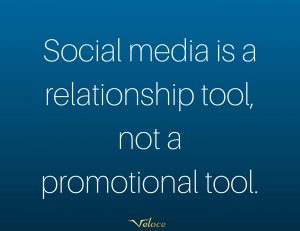
It might come as a shock, but on social media, you drive more marketing results by promoting less.
In fact, by focusing on providing your audience with content that brings them value, and by focusing on building customer relationships, you’ll not only be able to attract more people to your brand on social, but you’ll also be able to improve your customer relationships – which is the foundation for driving sales.
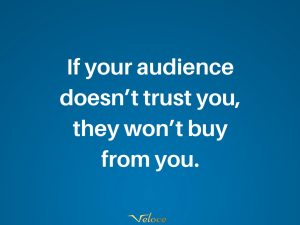
3.Ignoring your customer’s messages and comments
This is a huge social media marketing problem that I see many brands do.
And every time I see them do it, I drop a tear, because I know which amazing marketing benefits they’re missing out on.
Firstly, remember what I said just recently?
Social media is a relationship tool, not a promotional tool.
This means that the way you drive marketing results with social media is focusing on using it as a tool to improve your customer relationships and increase their trust in you.
This means that you want to take every opportunity you can to improve your customer relationships. Responding to comments and messages from your customers is obviously a part of that. With social media, you want to focus on both engaging with the people who engage with you, and you also want to focus on encouraging your audience to engage with you by engaging with them.
The best part is obviously when your audience takes the first step of engaging with you, but if you aren’t responding to them, you’re missing out on incredible opportunities.
First off, by ignoring your customers’ messages on social, you send them signals that you don’t care about them and that they aren’t important to you.
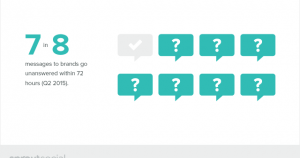
Think about it: if someone talks to you in real life, but you just turn the other way, how do you think they’ll feel?
And secondly, by not responding, you’re missing out on the opportunities of improving your customer relationships. Customer relationships lead to trust, and in order to build that trust, you need to take every single opportunity you can to engage with your audience.
A study found that a whopping five out of six messages sent to brands on social channels go unanswered.
Ouch.
And this is a big one among the social media marketing problems considering a study by Bain and Company found that customers who engage with brands over social media end up spending anywhere from 20% to 40% compared to customers who aren’t engaging.
Lastly, it’s important that you focus on both parts of the customer interaction, and this includes both listening and answering. When someone says something, thank them for their support in your brand, and if they complain about something, lsiten to what they re saying and then take appropriate action to make things right.
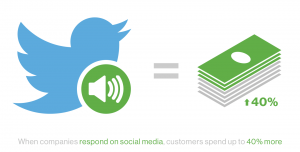
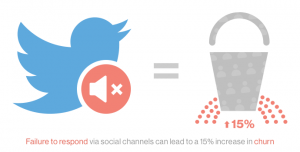
4. Social media marketing problems: Automation and scaling
In recent years, many brands have started to automate parts of their social media marketing process in order to streamline the work, and hopefully, drive better results but at a lower cost, compared to using a human resource.
The problem. however, is that while technology has come a long way, the technology isn’t fully developed and might not work perfectly.
The most common automation on social media that brands are using is chatbots.
This means that when customers come to the brand for customer service, there’s a bot that responds to their messages.
And that’s great, I am all for social media chatbots, but the problem is that they are not yet as advanced as they need to be in many cases, in order to provide a seamless customer service experience.
Just take a look at this chatbot fail:

In just a few years, we’ll be seeing technology evolve a lot, especially in the artificial intelligence space, but if you are going to use social media automation as you’re scaling your social media, you need to be aware of the limits and social media marketing problems that come with it.
5. Your content doesn’t resonate with your audience
On social media, it is crucial that your content resonates with your audience
Moreover, it is also crucial that it aligns with your brand and is consistent at all times.
Many brands make the mistake of trying to please everyone, and thus, they share all types of content, with no clear red string.
And what happens then is that no-one will resonate with your content, instead of having a more niche audience (your target audience) resonate with your content.
Your content is crucial for social media success, and this is why you need to develop a social media content strategy where you clearly define who your target audience is, what they resonate with, and what content they enjoy.
Your content needs to be consistent, relevant to your audience, and align with your brand’s values, but if it doesn’t, you’ll have a hard time attracting people, as well as have a hard time driving any results from your social media content.
In other words, it will be a huge social media marketing problem.
Conduct social listening to get a better understanding of what your audience likes and what they dislike, and try to identify the topics they are most passionate about.
In fact, why not ask them what type of content they’d like to see?
The most important part is that your content provides value in one way or another.
Because when you have something of value, people will come.
Your content can provide value in a number of ways, such as be educational, informative, entertaining, or funny, so try to identify what your audience prefers.
6. Not having an engaged audience
Not having an engaged audience is one of the social media marketing problems that can be quite frustrating, at least if you think of the fact that social media is called social for a reason, and that it is a relationship tool, not a promotional tool.
Because not having an engaged audience means that you’ll have a harder time engaging with your audience as well as building relationships with them.
However, here’s the deal:
If you don’t have an engaged audience on social media, and you’ve been using social media for a while, I hate to say it, but it depends on the way you’ve been using social media.
Obviously, if you’re using social media for marketing, but never engage with your audience, never respond to comments, etc, do you think your audience will continue to engage with you? Of course not.
So if you’ve been using social media for marketing for a while, but are not seeing the engaged you’d like to, you need to make some fundamental changes to your strategy.
For a successful social media marketing strategy, engagement is everything, and therefore, you need to implement things that can help increase your engagement on social media into your strategy.
This includes basic things like responding to messages and answering customer complaints, but it also includes more advanced things like social listening, understanding the sentiment of the conversations, and actively reaching out to your customers to start a conversation and build your engagement.
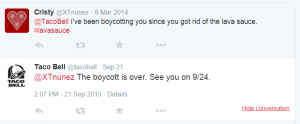
What I have found is that my absolutely most engaged followers are the ones I’ve responded to every single time, have deep conversations with, and be more personal with.
And that doesn’t come as a surprise since the principles of human interaction are no different just because they take place on social media rather than in real life.
To take your social media engagement to the next level, I highly recommend you to read how to skyrocket your social media engagement.
The bottom line?
Since the foundation for driving marketing result with social media is engagement and interaction, if you have a low engagement on social media, it will mean you’ll stand there with terrible preconditions to drive marketing results worthwhile, unless you update your strategy to first focus on increasing your engagement.
The good news is that the more you engage with your audience, the more they’ll engage with you, so make customer engagement a central part of your social media marketing strategy.
7. Using it because ”everyone says so”
This is one of the social media problems that stretches a bit further.
If you aren’t understanding the huge potential and benefits of social media, and are just using it because ”the market says you should”, then you will struggle with driving any results worthwhile.
Moreover, this notion might prevent you from setting any goals, metrics, and objectives, and if you don’t have a social media marketing plan and social media marketing strategy, you’ll struggle with driving any results, and most likely, social media won’t be very beneficial for your brand.
Now, without all of this, you might be able to drive amazing results, but when it comes to evaluating results, it will be close to impossible, or at least very difficult, and what will happen then is you’ll end up with the belief that social media is a waste of time and that it can’t drive any marketing benefits, while in reality, it can.
8.Not personalizing
Remember that social media is a relationship tool and not a promotional tool?
Well, in order to build relationships with people, you need to personalize the experience, develop a consistent brand voice and tone, as well as develop a brand personality.
And you need all of this to make it easier for your audience to resonate with your brand, and ultimately build a stronger relationship with you, and trust you more.
There are many parts that go into a personalized experience and more genuine and better relationships, but something as simple as calling someone by their name, as well as ending each message with your own name is a small detail that can have a huge effect.

Moreover, if you also add a photo of yourself at the end of the message, that’s even better and makes it easier for your audience to resonate with you.
To gain all the nitty-gritty parts of building strong relationships with your audience, read how to improve your customer relationships with social media.
The bottom line is that using social media to build customer relationships is everything, but you also need to focus on making the interactions more human and more personalized.
Humans build relationships with humans, not fancy logos and brands. Remember that.
9.Using the wrong social media platforms
This is one of the most common questions on social media, and as a result, you can also expect it to be one of the most common social media marketing problems.
Now, you might be thinking that all social media platforms are the same, or you might be wondering which of the several hundred social media platforms you should choose.
Either way, the social media platforms you choose to use it a tremendously important decision, because you might end up using a social media platform where your target audience his nowhere to be found, or you might be using a social media platform which doesn’t support the type of content that you’re best at creating.
Using the wrong social media platforms can mean that you are wasting your efforts by not reaching any of the people who are truly relevant to your brand.
This is why you need to look at the user demographics of the platforms that you hop on.
For most brands, the most obvious choices are the most common social media platforms such as Facebook, Instagram, Snapchat, Twitter, and so on, but just because they have a lot of users doesn’t mean they have the users you are looking to reach.
Moreover, you might find that there are other, less well-known social media platforms that are a lot better for you than the largest ones.
Identifying suitable social media platforms are difficult, but if you follow the steps in ”how to identify suitable platforms for your brand”, you’ll know exactly which social media platforms you should be using.
10.Giving up
This is one of the most common social media marketing problems that I see all the times.
Brands and marketers are uploading some posts and launching a campaign and then draw the conclusion that social media doesn’t work, or that it isn’t for them.
This is obviously a huge problem since it means giving up too quickly, and missing out on the amazing results social media can draw – if you just have the patience to watch them.
Nothing worth having comes easy, and for social media, great results demand great strategies, and patience in order to be able to see when those results come.
If you don’t have the patience to wait for the results to come, you’ll always be giving up right before the great benefits come.
The bottom line is that social media success comes from consistency and great strategies.
11.Social media marketing problems: not telling a story
In marketing, storytelling has proven to be incredibly effective, but as mentioned earlier, many of the marketers that hop on social media hops on with the notion that the more promotion they shove in their audience’s face, the better results they’ll be able to generate with social media.
The only catch is that the way you drive great marketing results isn’t by using that strategy, as we’ve now been able to conclude.
People resonate with stories, and the good news is that social media is an amazing tool for telling your personal, or your brand’s story.
There are millions of pieces of content being shared every single day on social media, and this means that the social media landscape is very saturated.
But with storytelling, you’ll be able to cut through the noise and make your audience better resonate with you.
Don’t just talk about shallow things like your 2 for one deal, but instead, use great storytelling to make your audience connect with you.
The results are amazing, but unfortunately, far from every brand are using it.
12.Social media marketing problems: Hashjacking
A social media marketing problem you need to pay attention to is hashjacking.
You’ve probably heard that hashtag-campaigns can be immensely effective for running campaigns on social media.
But the flip side is that while hashtags can be effective for marketing, they can also be used negatively against your brand by disgruntled customers and trolls.
Anyone can hop on a hashtag, but to stay out of the most common social media problems, be thoughtful with the hashtag you create for your social media campaigns.
Ask the question if the hashtag can be used against you in a negative manner.
Moreover, you also want to define scenarios how the hashtag can be used against you so that you’re better prepared if it happens.
If you do get struck by a social media storm, and hashjacking of your own hashtag, begin by looking at what people are saying, and if there’s actually any truth to it.
If you receive honest and real complaints, follow this formula of how you can deal with customer service on social media, but if there are just trolls who are spreading negativity, it’s normally best to just move on.
13. Improper Use slang term/inappropriate language
Now, this social media problem is to the absolutely highest degree dependent on you, but unless you do realize that it can turn into a problem, you’re dangerously close to making them.
Firstly, since social media is focused on relationships, you obviously want to embrace a brand voice and brand personality which resonates with your audience. If you can resonate better with your audience, they’ll have an easier time building a relationship with you. And this goes down to a human psychology level where we are more likely to approach and interact with people who are similar to ourselves.
Now, there are many brands who have embraced a humorist and funny brand voice, with the most common example being Wendy’s:

But the fact of the matter is that embracing that type of brand voice and personality doesn’t work for everyone.
And it all comes down to your target audience.
Obviously, If I run a brand which targets people who are 50 years and older, I obviously shouldn’t use teenage slangs and hip-hop references because of the simple fact that my target audience won’t relate with it.
Obviously, having the wrong personality and using the wrong brand voice can be a huge problem. Not only will it create a disconnect between you and your audience and make it harder for them to resonate with you, you’ll also alienate them to the point where they’ll go somewhere else.
The biggest problem, however, is when brands try to be hip and cool, but they fail miserably.
If you aren’t authentic, people will notice it in a heartbeat, and unless someone in your team genuinely knows the language and slang used by the people you are trying to target, it’s best to stay neutral so that you avoid embarrassing yourself by using slang and other references in awkward contexts.
Conclusion
As with everything, social media marketing has both upsides and downsides. Social media marketing comes with its own sets of problems and problems, but the good news is that the benefits of social media marketing clearly outweighs the downsides.
Social media marketing has proved itself able to generate amazing marketing results for marketers and brands, and this is also the reason why more and more brands has started incorporating social media marketing in their marketing strategy. The good news is that by being aware of the social media marketing problems, you can work around them, and avoid making any mistakes and operate around them.


